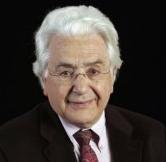
Algerian born scholar Mohammed Arkoun (February 1, 1928 – September 14, 2010) was a Senior Research Fellow at the Institute of Ismaili Studies and also a member of its Board of Governors, which is chaired by His Highness the Aga Khan
In a tribute to the Algerian Islamic scholar Mohammed Arkoun, who died at the age of 82 in Paris, France, on Tuesday, September 14, 2010, Algeria’s Minister of Culture, Khalida Toumi, said that Professor Arkoun “believed in dialogue between cultures and civilizations of which he was an ardent activist” and “his sincerity and dedication to bringing people and religions together have made him a true messenger of peace and harmony between different societies.” In her condolence message she also stated that he was “the author of books in the field of critical thinking who taught in the most prestigious universities of the East and the West.”
Amongst his peers around the world, Professor Arkoun was regarded as one of the most influential scholars in Islamic studies contributing to contemporary Islamic reform.
A native of the Berber village of Taourirt-Mimoun, Kabylie, Algeria, Mohammed Arkoun studied at the Faculty of Literature of the University of Algiers and at the Sorbonne in Paris. He established his academic reputation with his studies on Ibn Miskawayh (932-1030), a prominent Persian philosopher and historian. As he began to consider how one might rethink Islam in the contemporary world, his questioning provided a counterpoint to the predominant interpretations of both the Muslim world and the non-Muslim West. As the editor of Arabica, he broadened the journal’s scope, and played a “significant” role in shaping Western-language scholarship on Islam. He was the author of numerous books in French, English and Arabic, including Rethinking Islam (Boulder, Colorado, 1994), L’immigration: défis et richesses (Paris, 1998) and The Unthought in Contemporary Islamic Thought(London, 2002), in addition to shorter studies which appeared in many academic journals. His works have been translated into several languages.
He was decorated as an Officer of the French Légion d’honneur in July 1996. In 2001, Professor Arkoun was asked to deliver the Gifford Lectures, which contribute to the advancement of theological and philosophical thought, and he was also announced as the recipient of the Seventeenth Georgio Levi Della Vida Award for his lifelong contribution to the field of Islamic Studies. Before the Gifford Lecture, he had been invited to lecture members and staff of the United States Congress.
Professor Mohammed Arkoun (seated 4th from left, with Dr. Azim Nanji next to him) pictured with the faculty members and students who attended a Summer Programme on Islam held in August 2006 at McGill University’s campus, located in Montreal, Canada. The program was organized by The Institute of Ismaili Studies (IIS). Professor Arkoun was a member of the Board of Governors of the IIS, which is chaired by His Highness the Aga Khan, 49th Imam of Shia Imami Ismailis. Photo credit: IIS, London
Professor Arkoun taught both in Europe and North America in renowned academic institutions including the Paris 8 University, the New Sorbonne University of Paris, University of California, Princeton University, and the Pontifical Institute of Arabic Studies in Rome and the University of Amsterdam. He also served as a jury member for the Aga Khan Award for Architecture and at the time of his death he was a member of the Board of Governors of The Institute of Ismaili Studies, chaired by His Highness the Aga Khan, the 49th Ismaili Imam.
Excerpt from Mohammed Arkoun’s “Toward the Liberation of Islamic Consciousness,” Al Rayah (Qatar), 23 January, 2008.
Modernity does not offer options for all aspects of life, whether political, religious, legal, ethical, educational, scientific, including in economics and technology. Islam, being a visionary ideology stored in the unconscious, offers instead two facets, positive and negative.
The negative facet consists of the following: the ritual, symbolic, ethically imposed, political, and identity-related functions of this traditional political Islam have remained psychologically powerful. The high price of this has been fewer new criticisms of the fundamentals, values and, ethical, spiritual and religious criteria of this very traditional Islam.
This state of affairs will endure unless democratic values become deeply rooted in the political and religious culture of the governing elites in Muslim countries and reach the so-called people, who are in reality subjects rather than citizens. In fact, there exist no citizens or a democratic citizenship in Arab and Muslim countries. Professor Mohammed Arkoun’s work and interests concentrated on classical Islam and contemporary issues of Islam facing modernity. In a study on the Qur’an, Professor Arkoun began by situating his work in relation to the cumulative and comprehensive encyclopedia of the Qur’anic sciencesproduced at the end of the fifteenth century by Jalal al-Din al Suyuti (1445–1505). Arkoun demonstrated through his juxtaposition of Suyuti’s work and with that being done in the 20th century by both Muslim and Western scholars, how binding has been the fixation and circumscription of Qur’anic discourse, and how powerfully “dogmatic enclosure” was operating.
About his book “Rethinking Islam,” The New York Times wrote that it was “an illustration of the contemporary fecundity of Islam,” and described Arkoun as “the leading French-language spokesman calling for a rethinking of Islam in a modern mode.” The newspaper noted that Mr. Arkoun was highly critical of the past and present conditions of Islamic thought, and of contemporary Islamic societies and that while he was a devout believer in the message of the Qur’an, he felt that the Holy Book’s spiritual transformative power over the hearts and minds of Muslims had been obscured. The result was that the spiritual essence of the covenant between God and man had deteriorated into legal codes, rituals and ideologies of domination in the interest of religious and political elites. Arkoun argued that the great cultural achievements of the early Islamic era in bringing together Qur’anic revelation and Greek rational philosophic humanism had long been abandoned.
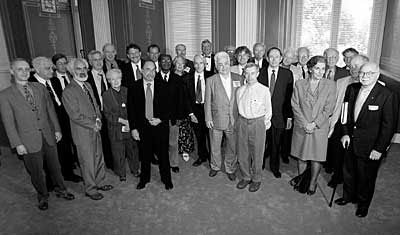
Mohammed Arkoun is seen above in the front row in a group picture taken with some of the speakers of the “Frontiers of the Mind” symposium held in 1999 at the US Library of Congress. His spirited presentation was on the need to reconceptualize the relationships between Islam and the West, building upon the intellectual and liberating traditions of Islamic thought rather than solely upon the recent “fundamentalist” assertions of Islamic polities The speakers at the symposium included (front row), Pierre Manent, Michael Fishbane, Mary Douglas, David Baltimore, Kwabena Nketia, Judith Brown, Martin Rees, Mohammed Arkoun, Michael Monastyrsky, Laura Nader and Daniel Bell; (back row) Vyacheslav Ivanov, Michael Woodford, Bruce Alberts, Jerome Friedman, Eric Lander, Marc Davis, Jonathan Spence, Prosser Gifford, Bert Bolin, Steven Pinker, Nils Hasselmo, Gerald Edelman, Leon Lederman, Neil Smelser, Shlomo Aviner, Wallace Broecker and Charles Rosen. Photo credit: Library of Congress Photo by Pat Fisher.
Dr. Arkoun also felt that the renewal of Qur’anic revelation would establish the intellectual apparatus essential to a critical formulation of an Islamic modernity. This renewal, he said, would not create a parochial, separatist, communalist form of Islam. Rather, it would reintegrate Islam into the monotheistic Mediterranean culture it shares with Judaism and Christianity.
In this context, he presented the example of Islamic Spain whose cross-cultural interaction and religious coexistence, inspired historians and diplomats, philosophers and poets. Speaking on the age of Ibn Rushd (1126–98), Maimonides (1135–1204), and Thomas Aquinas (1225–74), he said these three seminal thinkers should be interpreted not as representatives from different civilizations but as inhabitants of a combined “Mediterranean space” in which people of all backgrounds developed their ideas simultaneously. Ibn Rushd, Maimonides, and Thomas Aquinas were nourished by a humanist culture originating in Baghdad and Iran in the ninth and tenth centuries. Arkoun outlined several areas in which modern thinkers could benefit from the teachings of Islamic Spain. First, he noted, post-Renaissance Europeans have neglected to recognize this period as the foundation of humanist thought. Second, the European tradition has drawn a line between religion and philosophy, preventing modern academics from properly examining the influence of Islam on the European Middle Ages. This false separation leaves us ill equipped to deal with religious questions as these three thinkers did, with primacy given to powers of explanation. He explained that Ibn Rushd, Maimonides, and Thomas Aquinas offered an integrated view of history, and advised present day scholars to alter their approaches and refrain from the compartmentalization of ideas that limits their reading of Islamic Spain.
According to Arkoun, the Judeo-Christian West and the Muslim East must begin a truly constructive discourse based on mutual respect instead of indulging in nationalist politics and fundamentalist polemic. On the basis of similar religious teachings, for instance, Arkoun called for the creation of joint theology of Divine Revelation and the Word of God, as a common contemplative tradition already existed on which to build a shared spirituality. A partisan of liberal thought, Arkoun criticized politicians who used religion for state goals, as well as religious leaders who sought political power.
Within the Arab world, he called for a dialogue between Arab countries with a wider perspective, comprehensiveness and enlightenment than what currently existed. He wished for an “inquisitive” Arab Islamic culture, free from all common assumptions, even discussing taboo subjects. He was keen to uncover ways of thinking and socio-historical barriers that hamper progress. Arkoun also called for teaching the history of religions in schools of the Arab world instead of pure religious teaching in order to enable future generations to break away from religious fanaticism, which he considered one of the major causes of the current crisis in the Muslim world. Arkoun said that “to overcome our historical ordeal, we must enter an enlightened transition period that would adapt religious approaches to embrace the global modernist trend,” noting the problem caused when Arabs are raised not to question traditional teachings. He observed in his work “Battles for Humanism in Islamic Concepts,” that European Christians initially opposed modernism and humanism, but even fundamentalists eventually succumbed to those Renaissance ideas.
Perhaps because he was born a “Berber” in Algeria and having lived in France, Arkoun had a more detached objectivity about the values in many contemporary Islamic societies which found his thought “dangerous” as well as difficult to accept.
He insisted that the challenge facing Arab and Islamic societies was not much different than in earlier times. Instead of certain fundamentalist Muslims attacking the “intellectual invasion” of the West and reformist Islamic thinkers, Arkoun suggested that all in the Arab world must change their thinking to confront a deteriorating situation that is far worse than they fear.
Professor Mohammed Arkoun’s thoughts not only deserve close analysis on their own merit but also because, by observing how they are received in the Islamic world in the next few years to come, we may be able to gain insights into future directions of the intellectual debate on Islam.
Publication date: September 16, 2017.
_____________
References for the compilation of the above reading:
www.aku.edu
www.arabwashingtonian.org
www.theatlantic.com
www.islamuswest.org
www.ijtihadreason.org
www.ennaharonline.com

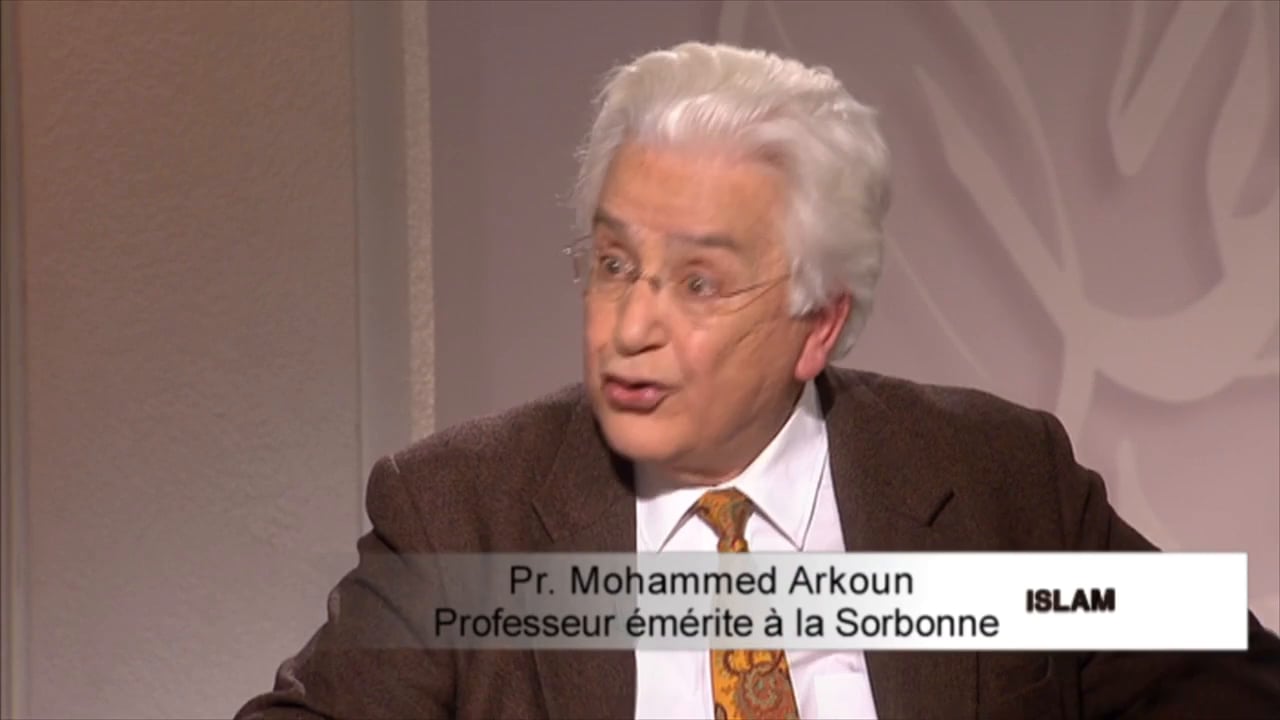
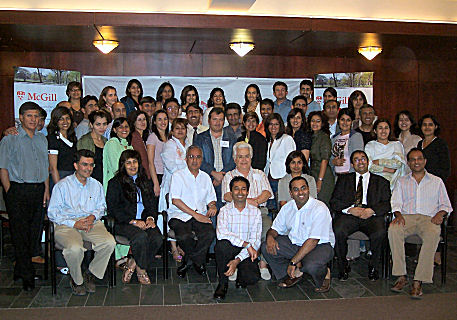
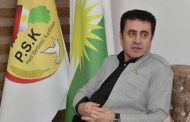

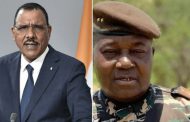
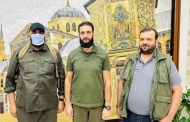

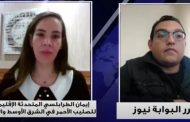
































admin in: How the Muslim Brotherhood betrayed Saudi Arabia?
Great article with insight ...
https://www.viagrapascherfr.com/achat-sildenafil-pfizer-tarif/ in: Cross-region cooperation between anti-terrorism agencies needed
Hello there, just became aware of your blog through Google, and found ...